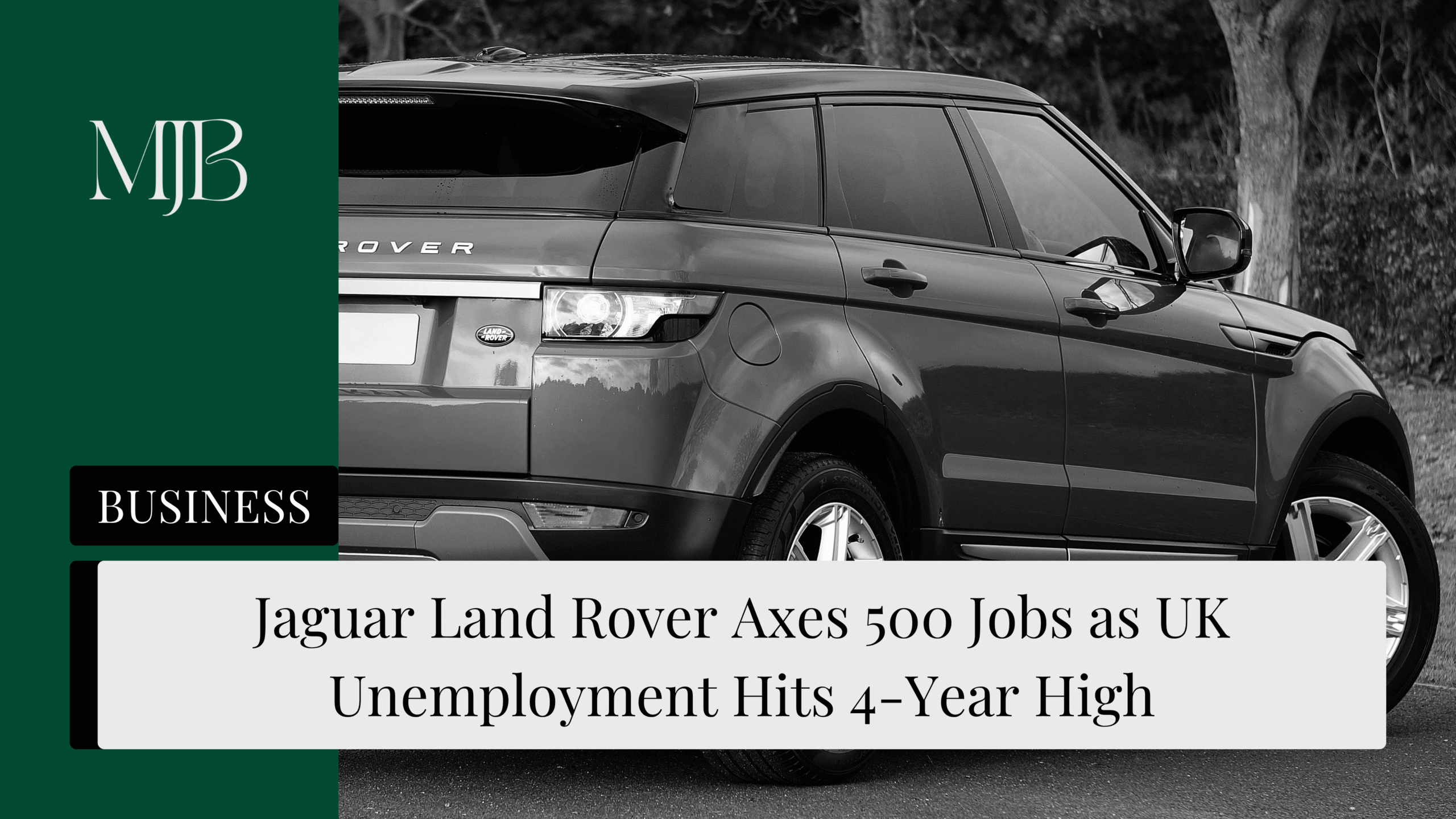When It Rains, It Pours: JLR and UK Labour Market Both Take a Hit
Here’s your Monday reality check: Jaguar Land Rover just announced it’s cutting 500 management jobs in the UK, and that’s not even the worst news. Britain’s unemployment rate has spiked to 4.7% – the highest we’ve seen since June 2021.
Talk about perfect timing. JLR’s voluntary redundancy programme affects about 1.5% of its UK workforce, coming right after the luxury carmaker saw retail sales crater by 15.1% in Q2. Meanwhile, the broader UK job market is showing cracks that have economists reaching for their stress balls.
JLR’s Sales Slump: Trump Tariffs Strike Again
Remember when Trump’s administration rolled out those new tariff plans in April? Yeah, JLR remembers too. The company had to pause US shipments, which helped tank their quarterly numbers.
But it’s not just trade wars causing headaches. JLR is also winding down older Jaguar models as part of its strategic refresh. Sometimes you’ve got to break a few eggs to make an omelet – even if those eggs cost jobs.
The Silver Lining (Sort Of)
JLR did throw in a positive note, crediting the new UK-US trade deal for giving them confidence to invest £3.5bn annually. A spokesperson said they’re “aligning leadership workforce for current and future needs” – corporate speak for “we’re rightsizing.”
UK Jobs Market: The Bigger Picture Gets Uglier
While JLR deals with its own issues, the UK labour market is painting a concerning picture. The Office for National Statistics dropped some heavy numbers:
The Bad News Breakdown
Unemployment jumped to 4.7% – worse than the 4.6% economists predicted. That’s 56,000 fewer job vacancies compared to last quarter, bringing the total down to 727,000.
Wage growth is cooling fast. Average earnings (excluding bonuses) slowed to 5% – the lowest in almost three years. Sure, it’s still outpacing inflation, but the trend isn’t your friend here.
What’s Driving the Downturn?
Companies are feeling the squeeze from multiple angles. National insurance contributions went up in April, along with minimum wage increases. Add Trump’s tariff uncertainty into the mix, and you’ve got a recipe for corporate caution.
The Bank of England is watching closely, with Governor Bailey hinting at potentially larger interest rate cuts if the job market keeps deteriorating.
The Bottom Line: Buckle Up for More Volatility
JLR’s job cuts might seem isolated, but they’re part of a broader economic slowdown that’s hitting everything from GDP growth to consumer confidence. With unemployment trending up and wage growth cooling, we could be looking at a challenging few quarters ahead.
The good news? Wages are still beating inflation, and companies like JLR are making strategic investments for the future. The bad news? That future might involve more short-term pain before we see the gains.
Want to stay ahead of economic shifts? Keep watching Bank of England interest rate decisions and US-UK trade developments – they’ll signal where both JLR and the broader job market head next.
FAQ
Q1: Why is JLR cutting jobs now?
A: JLR is cutting 500 management positions through voluntary redundancy as sales dropped 15.1% in Q2. The company is aligning its workforce with current business needs while transitioning away from older Jaguar models.
Q2: How bad is UK unemployment right now?
A: UK unemployment hit 4.7% in May 2025, the highest since June 2021. This is worse than economists expected and reflects broader economic pressures including rising business costs and trade uncertainty.
Q3: Are wages keeping up with inflation?
A: Yes, but barely. Wage growth slowed to 5% while inflation sits around 1.8%, meaning real wages are still growing by about 3.2%. However, this is the slowest wage growth in almost three years.
Q4: What’s causing the broader UK jobs slowdown?
A: Multiple factors: increased national insurance contributions, higher minimum wages, Trump’s tariff policies creating trade uncertainty, and overall economic weakness with GDP shrinking in April and May.
Q5: Should we expect more job cuts across the automotive sector?
A: Possibly. Automotive companies are facing similar pressures from trade tensions, supply chain costs, and transition expenses as they shift toward electric vehicles. JLR’s cuts could signal broader industry adjustments ahead.
DISCLAIMER
Effective Date: 15th July 2025
The information provided on this website is for informational and educational purposes only and reflects the personal opinions of the author(s). It is not intended as financial, investment, tax, or legal advice.
We are not certified financial advisers. None of the content on this website constitutes a recommendation to buy, sell, or hold any financial product, asset, or service. You should not rely on any information provided here to make financial decisions.
We strongly recommend that you:
- Conduct your own research and due diligence
- Consult with a qualified financial adviser or professional before making any investment or financial decisions
While we strive to ensure that all information is accurate and up to date, we make no guarantees about the completeness, reliability, or suitability of any content on this site.
By using this website, you acknowledge and agree that we are not responsible for any financial loss, damage, or decisions made based on the content presented.






